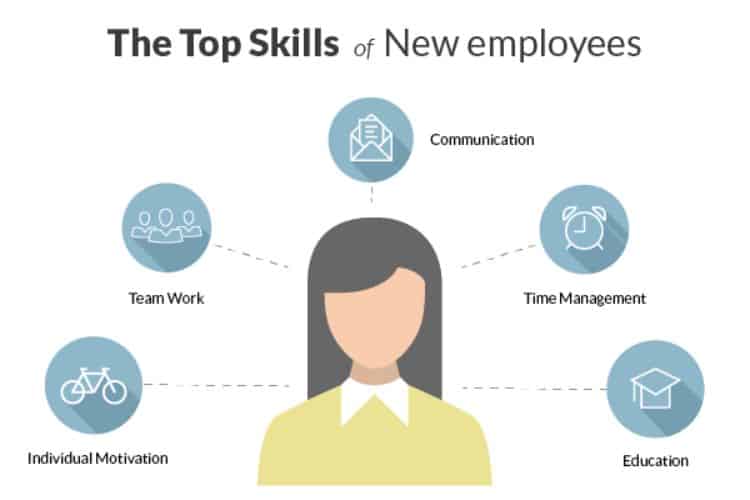Understanding the key skills employers seek is essential for standing out in the job market. As industries and technologies evolve, excelling in various areas becomes crucial. Whether you’re starting your career or aiming for a promotion, mastering these in-demand skills can significantly boost your job prospects.
This guide will explore the top job skills employers are currently looking for. We’ll break down each skill, explain its importance, and provide practical tips to help you develop these abilities. By focusing on these essential skills, you’ll be better positioned to succeed and advance in your professional journey.
1. Adaptability and Flexibility
Adaptability and flexibility are crucial in today’s dynamic work environment. Employers value individuals who can adjust to new situations and challenges seamlessly. For example, if a project’s deadline is moved up unexpectedly, an adaptable employee can quickly re-prioritize tasks to meet the new timeline.
How to Develop Adaptability:
- Embrace Learning: Try new tasks, such as learning a new software program.
- Stay Curious: Explore different roles or projects within your company.
- Be Open-Minded: Approach changes with a positive outlook.
2. Technical Skills
Technical skills are increasingly important across various industries. Here are some examples of technical skills and tools that are in high demand:
- Data Analytics Tools:
- Google Analytics: Helps track and analyze website traffic and user behavior.
- Tableau: A data visualization tool that turns data into interactive, easy-to-understand visuals.
- Microsoft Excel: Widely used for data analysis, budgeting, and reporting.
How to Enhance Technical Skills:
- Take Online Courses: Platforms like Coursera and Udemy offer courses on data analytics and technical skills.
- Practice Regularly: Use tools like Excel for personal budgeting or Tableau for analyzing sample data.
- Stay Updated: Follow industry blogs or forums to learn about new tools and techniques.
3. Communication Skills
Strong communication skills are vital for successful teamwork and project management. Clear communication helps prevent misunderstandings and fosters a positive work environment.
How to Improve Communication Skills:
- Practice Speaking: Join groups like Toastmasters to enhance your public speaking abilities.
- Seek Feedback: Ask colleagues or mentors to review your written and verbal communication.
- Listen Actively: Focus on understanding others’ viewpoints before responding.
4. Problem-Solving Skills
Effective problem-solving involves identifying issues and finding practical solutions. For example, if a project faces a budget shortfall, a problem-solver might propose cost-saving measures or alternative funding sources.
How to Build Problem-Solving Skills:
- Analyze Case Studies: Review business case studies to see how others solved problems.
- Practice Brainstorming: Use techniques like mind mapping to generate ideas.
- Seek Challenges: Volunteer for projects that require creative solutions.
5. Teamwork and Collaboration
Teamwork involves working well with others and contributing to a positive team dynamic. For example, collaborating effectively on a group project can lead to innovative solutions and successful outcomes.
How to Enhance Teamwork Skills:
- Participate in Group Projects: Engage in team activities, both at work and in volunteer settings.
- Build Relationships: Get to know your team members and their strengths.
- Offer Support: Help colleagues with their tasks and contribute to team goals.
6. Leadership Skills
Leadership is valuable at all levels of an organization. For instance, leading a project team involves setting goals, making decisions, and guiding team members toward success.
How to Develop Leadership Skills:
- Take Initiative: Lead a small project or volunteer for leadership roles in community organizations.
- Seek Mentorship: Learn from experienced leaders in your field.
- Develop Emotional Intelligence: Work on understanding and managing your emotions and those of others.
7. Time Management
Effective time management helps you balance multiple tasks and meet deadlines. Here are some tools to help you manage your time better:
- Planning Tools:
How to Improve Time Management:
- Use Planning Tools: Set up tasks and deadlines in tools like Trello or Asana.
- Set Priorities: Focus on high-priority tasks first using techniques like the Eisenhower Matrix.
- Avoid Procrastination: Break tasks into smaller steps and tackle them incrementally.
8. Creativity
Creativity is about generating new ideas and finding unique solutions. For example, a creative marketing approach might involve developing an innovative campaign that captures your audience’s attention.
How to Foster Creativity:
- Engage in Creative Activities: Try activities like brainstorming sessions or creative writing.
- Seek Inspiration: Look for inspiration from diverse sources, such as art or industry trends.
- Experiment: Test new ideas and approaches, and learn from the outcomes.
Conclusion
Mastering these top in-demand job skills—adaptability, technical skills, communication, problem-solving, teamwork, leadership, time management, and creativity—can significantly boost your career prospects. By focusing on these areas and using practical tools and strategies, you can become a more effective and appealing candidate in the competitive job market. Stay proactive in developing these skills, and approach your career with enthusiasm and a positive attitude.




